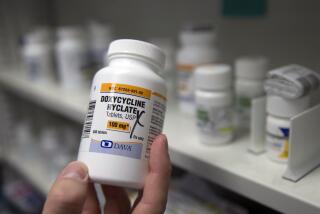Sexually transmitted diseases and young adults -- the proof is in the urine test
- Share via
Sexually transmitted diseases -- so easy to get, so difficult to remember how or when.
That’s not quite the conclusion of a new study published Monday in Pediatrics, but suffice to say: Don’t take a young adult’s claim of abstinence as proof he or she is disease-free. (The same may well hold true for older adults, but this study was limited to the young variety.)
Researchers at Emory University analyzed data from the National Longitudinal Study of Adolescent Health and tested 14,012 of the respondents (with their permission) for three sexually transmitted diseases: chlamydia, gonorrhea and trichomoniasis.
More than 10% of those found to have an STD said they’d been abstinent for 12 months. About 6% of those with an STD said they’d never had penile/vaginal contact. (Check the above links for the eyebrow-raising element in that claim.)
Perhaps some participants had a good reason for that STD-despite-claim-of-abstinence coincidence. It’s possible, after all, that some conditions had gone undiagnosed for more than a year. Somewhat less acceptable is the confusion about semantics explanation: “Just what is ‘abstinence’ anyway? I mean, really?”
In any case, excuses -- or recent abstinence -- don’t preclude the ultimate need for antibiotics. (Sex, Etc., offered by Rutgers University, answers young adults’ real-life questions about STDs.)
Here’s the full report, published Monday.
The researchers say their study cautions against relying too heavily on young adults’ accounts when assessing their likelihood of sexually risky behavior, adding: “all young people receiving clinical services, whether their sexual history indicates they are recently sexual active or not, should be tested for prevalent STDs.”
But perhaps the ultimate message for a general audience might be: Use condoms. Or truly be abstinent.






